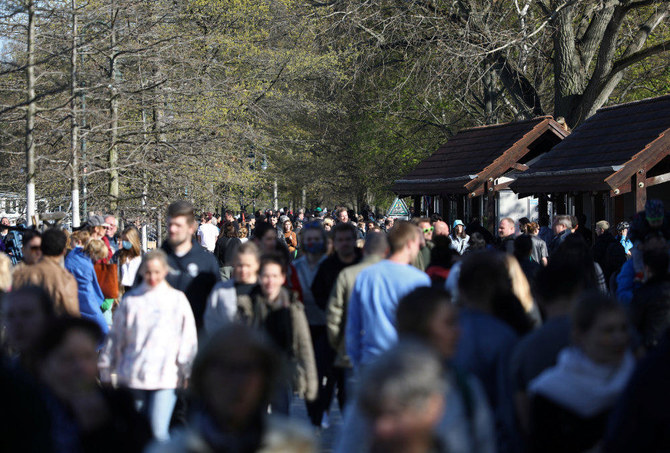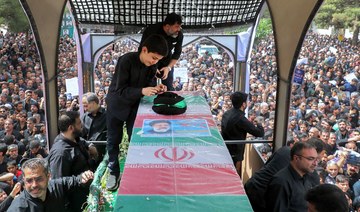BERLIN: Germany takes its first steps back toward normality on Monday, with smaller shops in some regions opening up for the first time in a month after politicians declared the coronavirus “under control.”
From florists to fashion stores, the majority of shops smaller than 800 square meters (8,600 square feet) will be allowed to welcome customers again, in a first wave of relaxations to strict curbs on public life introduced last month.
Chancellor Angela Merkel and regional state premiers announced the decision to reopen last week, though they have been careful to cast it as no more than a cautious first step.
While the first shops will open their doors on Monday, each of Germany’s 16 states is set to lift the restrictions at a slightly different pace.
In some states such as the capital Berlin, reopening will take a little longer.
Merkel, who has been praised for her handling of the coronavirus crisis, is hoping to reinvigorate the ailing German economy, which officially entered into recession last week.
With 139,897 confirmed cases and 4,294 deaths as of Sunday, Germany has been one of the countries worst hit by COVID-19, but also one of the quickest to react.
On Friday, the Robert Koch Institute for public health announced that the rate of infection — the number of people each ill person contaminates — had dropped below one for the first time, leading Health Minister Jens Spahn to declare the virus “under control.”
Yet Merkel, who was herself quarantined for two weeks earlier this month before testing negative for the virus, has warned that Germany’s success remains “fragile.”
“We will not be able to go back to our normal lives for a long time,” said her conservative party colleague Armin Laschet, the state premier of North-Rhine Westphalia, the country’s most populous region.
In an interview with Der Spiegel weekly, Laschet warned that some coronavirus restrictions could last until 2021.
A ban on gatherings of more than two people and a requirement to stand more than 1.5 meters apart from others in public areas remain in force.
That means that hairdressers, initially deemed an essential business, cannot open until at least May 4.
Cultural venues, bars, leisure centers and beauty salons will also remain closed for the time being, while large-scale public events such as concerts and football matches have been banned until August 31.
But Germans can look forward to at least some relaxations to the existing shutdown although they have not been welcomed by everyone.
With larger shops unable to open, the German Trade Association warned Friday of a possible “distortion of competition.”
Yet Economy Minister Peter Altmaier defended the 800-square-meter limit, saying that “the belt can only be loosened bit by bit.”
Schools will also be partially reopened in the coming weeks, with most states set to welcome back older students from May 4.
Education policy is traditionally decided at state level in Germany, and Bavaria, the region worst hit by the virus so far, will keep its schools closed for an extra week.
On April 29, regional education ministers are set to present concrete plans on how social distancing can still be enforced in the classroom.
Germany hopes to combine the lifting of restrictions with a more efficient tracing of the spread of COVID-19.
The country hopes to ramp up testing — it has already tested around two million people — and aims to produce around 50 million protective masks, including 10 million of the higher efficiency FFP2 standard a week from August.
Though not yet obligatory, Merkel said her government “strongly advises” wearing a mask in public.
With more movement of the population expected as shops reopen, eastern states Mecklenburg-Vorpommern and Saxony have made masks obligatory on public transport.
In doing so, they have followed the example of the eastern city of Jena, which unilaterally enforced the wearing of masks earlier this month.
According to German media, the city has had no new cases in a week.
With virus ‘under control’, Germany begins opening up
https://arab.news/4v6ss
With virus ‘under control’, Germany begins opening up

US authorities arrest man allegedly running ‘likely world’s largest ever’ cybercrime botnet

- Yunhe Wang was arrested on May 24 in Singapore, and authorities also seized $29 million in cryptocurrency: FBI
- Wang is accused of selling access to the 19 million Windows computers he hijacked to criminals
WASHINGTON: An international law enforcement team has arrested a Chinese national and disrupted a major botnet that officials said he ran for nearly a decade, amassing at least $99 million in profits by reselling access to criminals who used it for identity theft, child exploitation, and financial fraud, including pandemic relief scams.
The US Department of Justice quoted FBI Director Christopher Wray as saying Wednesday that the “911 S5” botnet — a network of malware-infected computers in nearly 200 countries — was likely the world’s largest.
Justice said in a news release that Yunhe Wang, 35, was arrested May 24. Wang was arrested in Singapore, and search warrants were executed there and in Thailand, the FBI’s deputy assistant director for cyber operations, Brett Leatherman, said in a LinkedIn post. Authorities also seized $29 million in cryptocurrency, Leatherman said.
Cybercriminals used Wang’s network of zombie residential computers to steal “billions of dollars from financial institutions, credit card issuers and accountholders, and federal lending programs since 2014,” according to an indictment filed in Texas’ eastern district.
The administrator, Wang, sold access to the 19 million Windows computers he hijacked — more than 613,000 in the United States — to criminals who “used that access to commit a staggering array of crimes that victimized children, threatened people’s safety and defrauded financial institutions and federal lending programs,” US Attorney General Merrick Garland said in announcing the takedown.
He said criminals who purchased access to the zombie network from Wang were responsible for more than $5.9 billion in estimated losses due to fraud against relief programs. Officials estimated 560,000 fraudulent unemployment insurance claims originated from compromised IP addresses.
Wang allegedly managed the botnet through 150 dedicated servers, half of them leased from US-based online service providers.
The indictment says Wang used his illicit gains to purchase 21 properties in the United States, China, Singapore, Thailand, the United Arab Emirates and St. Kitts and Nevis, where it said he obtained citizenship through investment.
In its news release, the Justice Department thanked police and other authorities in Singapore and Thailand for their assistance.
US to boycott UN tribute to Iran leader killed in helicopter crash

- The UN General Assembly traditionally meets to pay tribute to any world leader who was a sitting head of state at the time of their death
- US President Joe Biden’s administration was strongly criticized by some Republican members of Congress for offering condolences to Iran
UNITED NATIONS: The United States will boycott a United Nations tribute on Thursday to Iranian President Ebrahim Raisi, who was killed earlier this month in a helicopter crash, a US official said.
The 193-member UN General Assembly traditionally meets to pay tribute to any world leader who was a sitting head of state at the time of their death. The tribute will feature speeches about Raisi.
“We won’t attend this event in any capacity,” a US official, speaking on condition of anonymity, told Reuters. The US boycott has not previously been reported.
Iran’s mission to the United Nations in New York declined to comment.
Raisi, a hard-liner who had been seen as a potential successor to Supreme Leader Ayatollah Ali Khamenei, was killed when his helicopter came down in poor weather in mountains near the Azerbaijan border on May 19.
“The United Nations should be standing with the people of Iran, not memorializing their decades-long oppressor,” said the US official. “Raisi was involved in numerous, horrific human rights abuses, including the extrajudicial killings of thousands of political prisoners in 1988.”
“Some of the worst human rights abuses on record, especially against the women and girls of Iran, took place during his tenure,” the official said.
The UN Security Council stood at the beginning of an unrelated meeting for a moment of silence on May 20 to remember the victims of the helicopter crash. Deputy US Ambassador to the UN Robert Wood reluctantly stood with his 14 counterparts.
The United States expressed its “official condolences” for Raisi’s death, the State Department said on May 20. White House national security spokesperson John Kirby also said that day: “No question this was a man who had a lot of blood on his hands.”
US President Joe Biden’s administration was strongly criticized by some Republican members of Congress for offering condolences to Iran.
Raisi, 63, was elected president in 2021 and in office ordered a tightening of morality laws, oversaw a bloody crackdown on anti-government protests and pushed hard in nuclear talks with world powers.
UK parliament dissolves ahead of election

- Five weeks of campaigning officially began as 650 seats of MPs became vacant at 2301 GMT
- Prime Minister Sunak set the election for July 4, instead of later in the year as had been widely expected
LONDON: The British parliament dissolved on Thursday ahead of a July 4 general election, which looks set to bring Labour to power after 14 years of Conservative rule.
Five weeks of campaigning officially began as 650 seats of members of parliament (MPs) became vacant at one minute past midnight (2301 GMT) in line with the electoral schedule.
The first week of campaigning has seen a shaky start following Prime Minister Rishi Sunak’s rain-drenched election announcement, with many observers taking the downpour as a bad omen.
Sunak set the election for July 4, instead of later in the year as had been widely expected, in what observers said was an attempt to regain momentum as his party slides in opinion polls.
After 14 years in opposition, the Labour party now has the chance to win back power with its leader Keir Starmer, a former human rights lawyer, at the helm.
Trailing double digits behind Labour in polls, the ruling party also faced a mass exodus of parliamentarians, some throwing in the towel in the face of bleak chances of victory.
Some 129 MPs have so far announced that they will not be standing for re-election. Among them are 77 Conservatives, an unprecedented exodus for a governing party.
Among the Tories standing for re-election, some have made no secret of their annoyance at having been caught off guard by the July election date.
Steve Baker, Secretary of State for Northern Ireland, stood by his decision to continue his vacation in Greece, saying that he would be preparing his campaign there.
Signs of infighting also spilled into the open with one Tory MP backing a candidate from the right-wing populist Reform UK party in her constituency, before being promptly suspended by the Conservatives.
After the election announcement, Sunak traveled across the country, promoting Conservatives as the “safe” option.
His campaign met with some early snags, including a visit to the site where the Titanic was built drawing comparisons between his leadership and captaining a sinking ship.
Doubling down on older voters and right-wing supporters, Sunak’s campaign has seen pledges to bring back national service and what is billed as a £2.4 billion ($3 billion) tax break for pensioners.
However, Sunak’s week of intense campaigning and bid to surprise the country have done little to boost favor.
Polls put Labour on average at 45 percent of voting intentions, against 23 percent for the Tories, suggesting that, given the simple-majority voting system, Labour will enjoy a very large win.
In a bid to turn things around, Sunak is hoping to win points in the scheduled debates with Keir Starmer, the first of which is set to take place next Tuesday on ITV.
Meanwhile, Labour is seeking to capitalize on the public’s weariness with the Conservatives, who have seen five prime ministers since 2016 alongside a slew of scandals and economic woes.
It has tried to focus on its shift to the “natural party of business” after winning the backing of 120 industry leaders this week.
After a resounding defeat under left-wing leader Jeremy Corbyn in 2019, Starmer has pushed the party to the center in a bid to win back voters, including by purging Corbyn and making moves to root out anti-Semitism.
However, the past week has exposed the long-standing factional splits within the party, with MP Diane Abbott expressing her dismay at the party’s desire to bar her from candidacy.
Starmer has insisted that the fate of Abbott, who was suspended last year for comments on racism, had not yet been decided. But the treatment meted out to the highly respected 70-year-old, who has spent 37 years as a member of parliament, has provoked fierce criticism.
Starmer has also faced condemnation from leftist voters who accuse him of rolling back promises he made during his successful leadership campaign.
US says new UN draft on Gaza war will not help anything

- Washington, increasingly frustrated with how Israel is waging the war and its mounting civilian death toll, allowed that resolution to pass by abstaining from voting
UNITED NATIONS, United States: The United States is wary of a new UN resolution on the war in Gaza, its deputy ambassador said Wednesday, as a draft seeks an immediate ceasefire and a halt to Israel’s offensive in Rafah.
Algeria called an urgent UN Security Council meeting on Tuesday after an Israeli strike killed 45 people at a tent camp in Rafah for displaced people on Sunday, drawing international condemnation.
“We’ve said from the beginning that any kind of additional product on the situation right now probably is not going to be helpful,” deputy US envoy Robert Wood told reporters, referring to a text from the council.
“It’s not going to change the situation on the ground.”
Algeria started circulating its draft among fellow members of the Security Council after the emergency meeting.
The draft resolution, which draws on last week’s ruling by the International Court of Justice (ICJ), “decides that Israel, the occupying Power, shall immediately halt its military offensive, and any other action in Rafah.”
It also “demands an immediate ceasefire respected by all parties, and also demands the immediate and unconditional release of all hostages.”
No vote on the text has been scheduled yet.
“We don’t think another resolution is really going to change the dynamics on the ground,” said Wood.
Wood said the United States, which freely uses its veto power in the Security Council to protect Israel, believes that negotiations in the region are the proper way to achieve a ceasefire.
In Washington, White House national security spokesman John Kirby said the Algerian text is imbalanced and fails to note that “Hamas is to blame for this conflict.”
Gaza-based Hamas leader Yahya Sinwar could end the fighting right away if he agreed to a ceasefire and hostage release deal, said Kirby.
In early May indirect talks between Israel and Hamas failed to achieve a ceasefire and a hostage and prisoner release deal. Qatar, Egypt and the United States acted as intermediaries.
In a meeting on Wednesday, many members of the Security Council noted the ICJ ruling last week ordering Israel to halt its offensive in Rafah immediately.
“This council should speak out urgently on the situation in Rafah and call for an end to this offensive,” French Ambassador Nicolas de Riviere said.
The ambassador from Guyana, Carolyn Rodrigues-Birkett, said her country felt helpless “in the face of the dehumanization of a people, disregard for the rule of law and impunity.”
“When will it end? Who can make it end?” she asked.
“And yet, we cannot afford to remain silent, as too many have already been tragically silenced, forever, in this war,” said Rodrigues-Birkett.
The council has struggled to find a unified voice since the war broke out with the October 7 Hamas attack on Israel, followed by Israel’s retaliatory campaign.
The Hamas attack resulted in the deaths of 1,189 people, mostly civilians, according to an AFP tally based on Israeli official figures.
Militants also took 252 hostages, 121 of whom remain in Gaza, including 37 the army says are dead.
Israel’s retaliatory offensive has killed at least 36,171 people in Gaza, mostly civilians, according to the Hamas-run territory’s health ministry.
After passing two resolutions centered on the need for humanitarian aid to people in Gaza, in March the Security Council passed a resolution calling for an immediate ceasefire — an appeal that had been blocked several times before by the United States, Israel’s main ally.
Washington, increasingly frustrated with how Israel is waging the war and its mounting civilian death toll, allowed that resolution to pass by abstaining from voting.
France accuses allies of ‘political positioning’ in recognizing Palestinian state

- French President Emmanuel Macron said the same day he would be prepared to recognize a Palestinian state, but such a move should “come at a useful moment“
- “France is not involved in any political positioning, it is looking for diplomatic solutions to this crisis,” Sejourne added
PARIS: France’s foreign minister Wednesday accused fellow EU members Spain and Ireland of having recognized Palestinian statehood as part of “political positioning,” instead of seeking a solution to the Israeli-Palestinian conflict.
Spain, Ireland and Norway on Tuesday officially recognized the State of Palestine, sparking a furious response from Israel.
French President Emmanuel Macron said the same day he would be prepared to recognize a Palestinian state, but such a move should “come at a useful moment” and not be based on “emotion.”
Foreign Minister Stephane Sejourne told senators that France was “in favor of a two-state solution,” under which the states of Israel and Palestine would coexist in peace.
“By definition, the issue of recognition will of course come into that. But the concern now — which I have clearly shared with my Spanish and Irish counterparts — is what happens the day after recognition: How diplomatically useful is it?” he said.
“France is not involved in any political positioning, it is looking for diplomatic solutions to this crisis,” Sejourne added.
“It is unfortunate that a certain number of European states put political positioning first in the context of campaigning for the European elections, which does not solve anything.”
European Parliament elections are due to be held next week.
“Tell me, what exactly has the Spanish recognition changed a day later in Gaza? Nothing!” the foreign minister said.
The latest Gaza war was sparked by Palestinian militant group Hamas’s unprecedented October 7 attack on southern Israel, which resulted in the deaths of 1,189 people, mostly civilians, according to an AFP tally based on Israeli official figures.
Militants also took 252 hostages, 121 of whom remain in Gaza, including 37 the Israeli army says are dead.
Israel’s retaliatory offensive has killed at least 36,171 people in Gaza, mostly civilians, according to the Hamas-run territory’s health ministry.
The Israeli military says 292 soldiers have been killed in the Gaza military campaign since the start of the ground offensive on October 27.




















